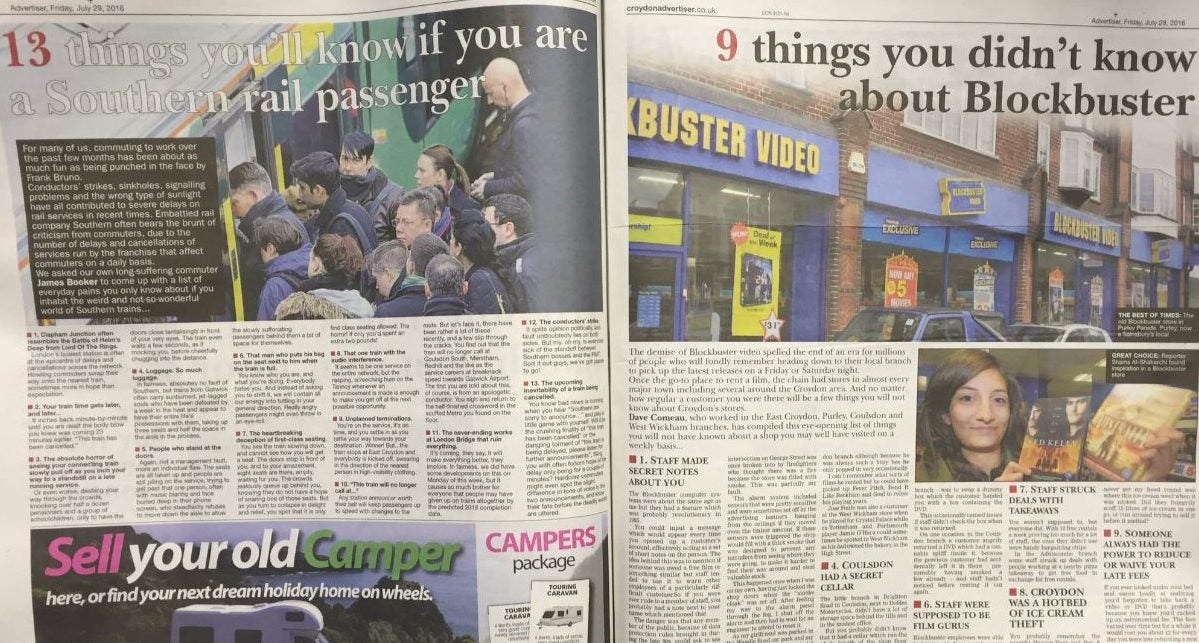
Many who have worked in the regional press will understand the sense of impotent rage felt by former star reporter for the Croydon Advertiser Gareth Davies which led him to sound off against his former employer on Twitter.
Whether you blame profit-hungry big publishers, or wider forces beyond anyone’s control, it is true that many local newspaper titles are a pale shadow of what they once were.
His comments about the new alleged “clickbait” culture at his newspaper have reignited the debate about the future of local news in the UK.
It’s the groundstone of our industry and society, it’s where news begins and where most original journalism holding those in power to account happens. And it is facing a dreadful crisis.
Our best guess is that at least half the jobs in the local press have gone over the last decade.
The Croydon Advertiser is one of 80 newspapers bought by Trinity Mirror in its merger with Local World last year. Dozens of talented reporters and editors like Davies have been let go. Many Local World newspapers no longer even have their own dedicated editor.
The strategy pursued by Trinity Mirror is reflected at the other regional giants – Newsquest and Johnston Press.
Davies is angry because he feels passionate about the stories that matter to local people and seems to fear they won’t get told under new ways of working.
Trinity Mirror editorial director Neil Benson has responded by saying the company’s new digital-first model is leading to better print and digital numbers.
He said (in a lengthy response): “The days when reporters could choose, arrogantly, to write about what interests them, rather than what interests the audience, are over.”
I’ve always felt that the best journalists base their work on a gut instinct for what readers are interested in and what is important. A better word than arrogance might be a sense of duty – not to the bottom line, but to your readers and the title you are proud to represent.
Davies has expanded on his Tweets for the Subscribe blog.
After Trinity Mirror’s cutbacks on its South East England titles (including the Croydon Advertiser) six trainee reporters now cover an area with a population of 3.5m, he says.
They file copy for multiple titles and apparently have zero input in the print editions. Hence the back-to-back non-local listicles which appeared in the print edition of the Advertiser highlighted by Davies (pictured top).
The stark reality of producing print newspapers and rolling news websites with one, much reduced editorial team, is that the former has become a mere by-product of the latter.
It mirrors the approach taken by Johnston Press on the papers I began my career on in Sussex. The old system whereby reporters found stories by building up trust and knowledge on their local patch has, apparently, been abandoned in favour of a pooled reporting approach.
Davies quotes new Trinity Mirror guidance given to reporters: “If you don’t think a story is likely to get at least 1,000 page views then talk [to an editor] and we can make a judgement on whether we feel something should be covered.”
He fears that this is a recipe for crass clickbait-style stories taking precedence over issues which may be hugely important to a smaller number of local readers.
Davies said many of the stories he published which led to a change in the law on drug-driving would not pass the 1,000 clicks threshold.
These changes are not just happening at the Croydon Advertiser but at newsrooms across the country. Perhaps there are 1,000 Gareth Davieses out there itching to speak out. Or perhaps many think technology has changed local journalism for the better.
Press Gazette wants to find out.
If you work for a local newspaper please contact us (anonymously) and let us know how your newsroom has changed in recent years. Or else if you are a local newspaper reader and would like to comment on how your title has changed we would like to hear from you too.
The sort of questions we would like answered include:
Has the editorial staff declined, if so by how much?
Are important stories still getting covered?
Are courts and councils still covered as well as they used to be?
Are more or less mistakes made nowadays?
How have new web-focused ways of working changed your journalism?
What sort of newsroom reorganisations has your title experienced? Have they improved things or not?
How well do you think your newsroom is managed?
Is there a better way of doing local journalism in the commercial sector? If so what is it?
Press Gazette would like to publish your comments but we won’t publish anything which could identify you (if you don’t want us to). If possible please just say which publishing group you work for and for what sort of title (eg. website, weekly free newspaper, weekly paid-for, daily paid-for).
Please email your response to dominicp@pressgazette.co.uk or else use this anonymous Google form. Don’t use your work email!
Email pged@pressgazette.co.uk to point out mistakes, provide story tips or send in a letter for publication on our "Letters Page" blog

